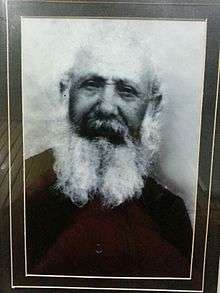Baba Kanshi Ram

| Baba Kanshi Ram | |
|---|---|
| Born |
11 July 1882 Dada Siba, Himachal Pradesh |
| Died | 15 October 1943 |
| Other names | Pahari Gandhi |
| Organization | Indian National Congress |
| Movement | Independence |
Baba Kanshi Ram (11 July 1882 – 15 October 1943) was an Indian poet and activist for independence born in the Indian state of Himachal Pradesh.[1]
Independence campaign
In 1911, attended the Delhi Durbar.
.jpg)
The turning point for him came in 1919, when the Jallianwala Bagh Massacre occurred, while he was in Amritsar. After this incident, he returned home to Kangra and started spreading Mahatma Gandhi's message through his poetry and songs in the Pahari languages. He was first arrested on 5 May 1920 and spent the following two years in Dharamshala jail along with Lala Lajpat Rai. He was released on 11 November 1922.
The death sentences handed out to Bhagat Singh, Rajguru and Sukhdev in 1931 had a great impact on him. He vowed to wear black clothes until India achieved its independence. He adhered to his vow until he died[2] on 15 October 1943 and came to be known affectionately as the Siahposh General (General in Black).[3]
Poetry
He published an anthology of 500 of his poems, eight short stories and a novelette, covering a number of subjects, including metaphysics, mysticism, romance and hardships of farmers of Himachal.
Some of his poems are:
- Angrez Sarkar Da Tigha Par Dhiare ("The British Government is on Her Last Legs")
- Smaj nee roya ("Society, Do Not Shed Tears")
- Nikke, nikke mahnua jo dukh bara bhari ("Great Sorrows of Small People")
- Ujari kangre des jana ("Kangra will be Destroyed")
- Mera suneha bhukhyan nangiyan yo ("My Call to the Hungry and Poor")
- Na kar gallan munuan kanne jaane diyan ("Oh Lad, Do Not Talk about Going Together")
- Kanshi ra suneha ("Call from Kanshi")
He was conferred the title of Bulbul-e-pahar (Nightingale of the hills) by Sarojini Naidu, who was herself called the Nightingale of India.
References
- ↑ "Mention in Himachal government official site". Archived from the original on 23 August 2006. Retrieved 28 July 2006.
- ↑ "Baba Kanshi Ram's biography on FreeIndia.org". Retrieved 28 July 2006.
- ↑ "The Tribune pays a tribute to Baba Kanshi Ram". Retrieved 28 July 2006.